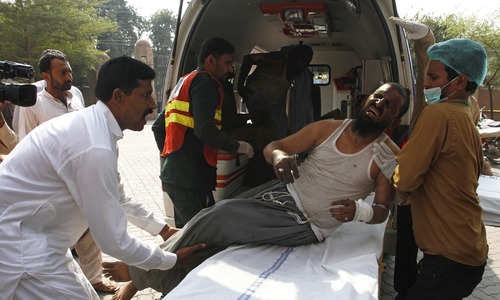LAHORE: The Pakistan Railways administration on Monday suspended six grade 17 and 18 officials from service for showing negligence in the discharge of their duties that led to a massive fire in three coaches of Tezgam Express near Liaqatpur (Rahim Yar Khan district) on Oct 31.
The administration took the decision in the light of a preliminary inquiry conducted by the Federal Government Inspector of Railways (FGIR) who submitted his report to the Federal Secretary/Chairman on Saturday night.The FGIR will submit his detailed inquiry report in next two weeks.
Though the PR admin has also removed a grade-20 officer from the job of divisional superintendent, Multan, it didn’t mention the reason behind his transfer. However, an official source also linked his removal with the Tezgam fire.
In the light of the FGIR recommendations, the administration suspended Railways Karachi division’s commercial officer Junaid Aslam, assistant commercial officer Ahsanul Haq, Sukkar division’s assistant commercial officers (ACOs) Abid Qamar Sheikh and Rashid Ali and deputy superintendents of railway police (DSPs) Karachi and Sukkar division Dilawar Maimon and Habibullah Khattak.
Moreover, Amir Muhammad Daoodpota was removed from the position of divisional superintendent (Multan) and asked to report to the Ministry of Railways. In his place, Shoaib Adil (chief traffic manager, dry-port, PR headquarters) was posted as the Multan DS.
“It is perhaps for the first time under the sitting Railways Minister Sheikh Rashid that rail authorities have taken a serious action against senior officials for showing negligence leading to the train tragedy that left 74 passengers dead and many others injured besides causing a loss of millions of rupees to the public and private property (coaches, luggage etc),” an official source said.
According to him, in the past the PR management would scapegoat lower-grade staff like drivers, assistant drivers, guards etc. He said serious administrative, operational and security lapses led to Thursday’s Tezgam inferno, as the officials who were supposed to take measures to avert such accidents apparently showed sheer negligence in discharging their duties, ignoring the relevant laws or standard operating procedures (SOPs).
Under section 59(1) of the Railways Act, 1890, “no passenger/person is allowed to take with him/her, or to require railway admin to carry, any dangerous or offensive goods in trains, stations, offices etc”.
Similarly, as per article 6.5 of the coaching tariff (II), “explosives, dangerous and inflammable things cannot be booked”. Moreover, clause-2 of the caution as narrated in the Railways Act prohibits lighting oil stoves or any kind of fire inside the train compartments.
“A caution has also been issued in the interest of the passengers to ensure their safety as well as of the rolling stock. There have been cases in the past when such irregular practices resulted into loss of lives, injury to passengers and substantial damage to the coaches,” reads the report.
The report says that due to the fire incident, eight trains remained stuck for about four to seven hours at various stations (Liaqatpur, Khanpur, Rahimyar Khan, Kot Semaba, Tarinda and Sahja) on way to their destinations.
“Though those who carried stoves and cylinders inside the train were also at fault, the railway officials too are guilty of not stopping them by checking their luggage when they entered the station’s premises and then the coaches of the ill-fated train. So I think the railway police performing duty at stations as well as inside trains, the conductor guards, the ticket examiners, station masters, assistant station masters and others are legally and morally bound to deny entry to the passengers carrying such items (gas cylinders, stoves etc). And had they performed their duties well under the rules of business and the SOPs, they could have averted this tragedy,” the official explained.
Published in Dawn, November 5th, 2019














































